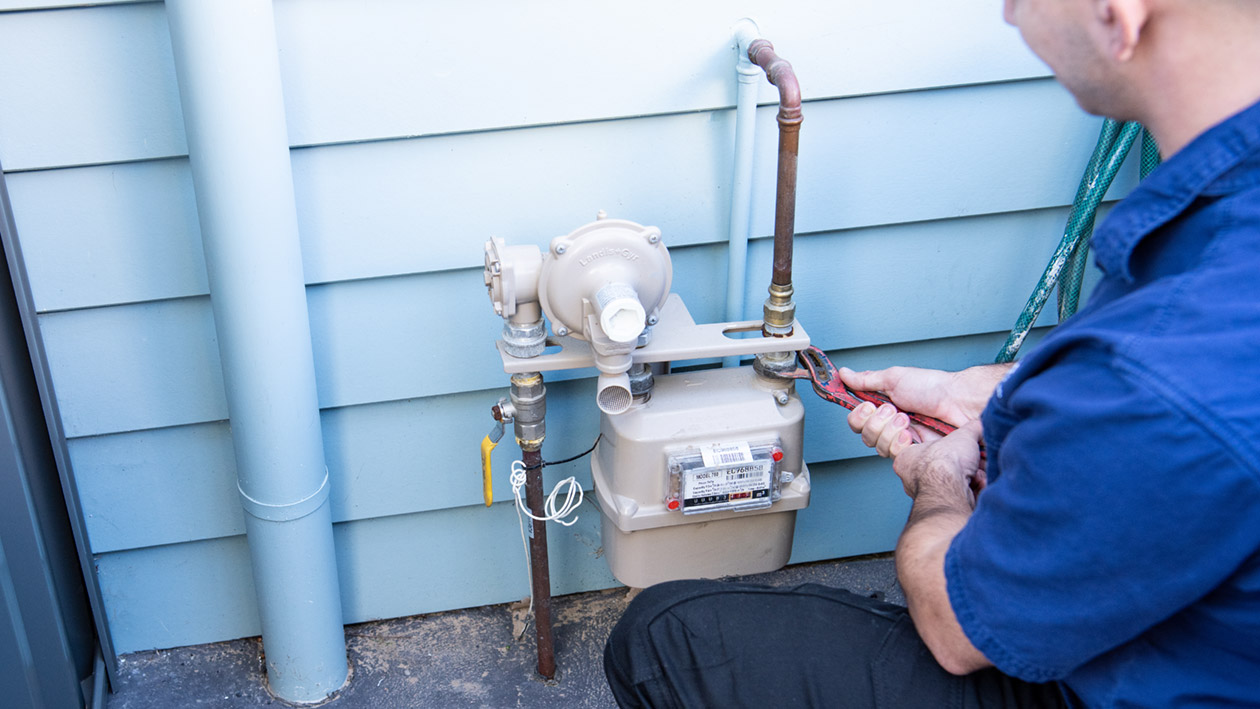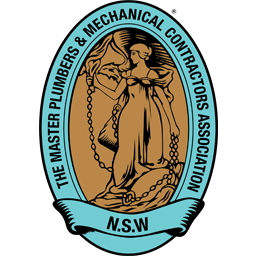A gas fitter is a licensed specialist who installs, services, and repairs gas pipelines and appliances in residential, commercial, and industrial settings. While some plumbers are also licensed gas fitters, the roles are distinct; a gas fitter possesses the specific qualifications required to work safely and legally on gas systems, from cooktops and hot water systems to mains connections and leak detection.
Do You Suspect a Gas Leak? Immediate Safety Steps
If you smell gas, do not operate any electrical switches or create a flame. Your priority is to stop the gas flow, ventilate the area, and call a licensed gas fitter or your gas provider’s emergency line from a safe location. This is a critical safety situation that requires immediate professional attention.
The Immediate Action Safety Checklist
- No Sparks or Flames: Do not smoke, light matches, or operate electrical appliances (including light switches and phones).
- Ventilate: If possible, open all doors and windows to air out the area.
- Turn Off the Gas: If you know where your gas meter is and can do so safely, turn the valve to the “off” position (usually when the lever is at a right angle to the pipe).
- Evacuate & Call: Leave the premises immediately. From a safe distance (e.g., a neighbour’s house), call your gas provider’s 24/7 emergency number or a licensed emergency gas fitter.
Try This Now
- Find your gas provider’s emergency number on a recent bill and save it in your phone now
- Locate your gas meter and understand how to turn it off before an emergency occurs
Emergency Contacts for Major NSW Gas Suppliers
- Jemena: 131 909 (24/7 Gas Emergency)
- Australian Gas Networks: 1800 427 532
- AGL: 131 909 (Gas Emergencies)
- Origin Energy: 132 771 (Emergencies)
Gas Fitter vs. Plumber: Who Do You Need to Call?
For any work involving a gas pipe or a gas-powered appliance, you legally require a licensed gas fitter. While many plumbers are dual-qualified, a general plumber without a gas licence cannot work on your gas systems. Always check for their gas fitting licence.
| Task | Call a Plumber | Call a Licensed Gas Fitter |
|---|---|---|
| Leaking Taps / Toilets | ✅ | ❌ |
| Blocked Drains | ✅ | ❌ |
| Installing a New Gas Cooktop | ❌ | ✅ |
| Repairing a Gas Hot Water System | ❌ | ✅ |
| Smelling Gas / Leak Detection | ❌ | ✅ |
| Installing a New Dishwasher | ✅ | ❌ |
| Running a New Gas Line for a BBQ | ❌ | ✅ |
| Servicing Gas Heaters | ❌ | ✅ |
| Carbon Monoxide Testing | ❌ | ✅ |
Best For:
- Call a Plumber for: Water-related issues—leaks, blockages, and installations of water-based fixtures
- Call a Gas Fitter for: Gas-related issues, installations, maintenance, and repairs of gas lines and appliances
Self-Check Method
Before hiring, ask the tradesperson: “Can I see your gas fitting licence number?” and verify it with NSW Fair Trading’s online licence check system. In NSW, gas fitters must hold a valid contractor licence or be employed by someone who does.
How to Become a Gas Fitter in Australia: A 3-Step Career Guide
Becoming a gas fitter in Australia involves completing a formal apprenticeship, achieving a Certificate III in Gas Fitting, and obtaining the required state-based licences. This ensures you have the technical skill and safety knowledge to work legally on gas systems, a process that typically takes 3-4 years.
The Career Roadmap
Step 1: Get an Apprenticeship
Secure a position with a licensed gas fitting company. You’ll need to be hired as an apprentice to begin your practical training. Search on sites like Seek, Indeed, or through Group Training Organisations in NSW.
Step 2: Complete Your Formal Training
Enrol in and complete a Certificate III in Gas Fitting (CPC32720) at a registered training organisation like TAFE NSW. This is done concurrently with your apprenticeship and includes both on-the-job training and formal classroom instruction.
Step 3: Obtain Your Licence
After completing your qualifications, apply to NSW Fair Trading for your gas fitting licence. You’ll need to pass the required assessments and meet the experience requirements. In NSW, you can apply for:
- Gasfitting work on Type A appliances (domestic appliances)
- Gasfitting work on Type B appliances (industrial and commercial)
Common Mistakes to Avoid
Mistake: Doing a plumbing apprenticeship and assuming it automatically covers gas.
Solution: Ensure your apprenticeship and training explicitly include the gas fitting units and qualifications required for licensing in NSW.
Mistake: Working on gas systems without proper supervision during your apprenticeship.
Solution: Always work under direct supervision of a licensed gas fitter until you hold your own licence, it’s not just best practice, it’s the law.
Gas Fitter Salary in Australia: What Can You Really Earn?
A qualified gas fitter in Australia can expect to earn an average salary between $75,000 and $100,000 per year. However, experienced specialists, those who own their own business, or those working in high-demand industrial sectors can earn well over $150,000 annually.
Earning Potential by Experience Level
- Apprentice (Years 1-4): $35,000 – $55,000
- Newly Qualified: $65,000 – $75,000
- Experienced (5+ years): $80,000 – $100,000
- Specialist/Business Owner: $100,000 – $150,000+
Real-World Career Applications
Employee: Stable income with benefits, but salary is capped by your employer’s pay structure. Great for work-life balance and consistent hours.
Subcontractor: Higher hourly rates ($50-$100+ per hour), but less job security and need to manage your own tax and super.
Business Owner: Highest potential income, but also responsible for all business overheads, insurance, and regulatory compliance. Success depends on business acumen as much as technical skill.
What Gas Fitters Actually Do: Day-to-Day Responsibilities
Gas fitters perform a wide range of essential services that keep homes and businesses running safely:
Residential Services
- Install gas cooktops, ovens, and BBQ connections
- Service and repair gas hot water systems
- Conduct gas leak detection and repairs
- Install gas heaters and bayonet points
- Perform carbon monoxide testing
- Issue compliance certificates for gas installations
Commercial & Industrial Services
- Install and maintain large commercial gas systems
- Service industrial gas equipment (Type B appliances)
- Conduct gas pressure testing
- Install gas meters and regulators
- Perform scheduled maintenance on commercial kitchen equipment
- Ensure compliance with Australian Standard AS/NZS 5601
Safety & Compliance
- Conduct gas safety inspections
- Issue gas compliance certificates
- Test for carbon monoxide emissions
- Ensure all work meets NSW Fair Trading requirements
- Maintain detailed service records for regulatory compliance
When to Call a Gas Fitter: Common Scenarios
Understanding when you need a gas fitter can save you time, money, and potentially your life:
Immediate Action Required
- You smell gas anywhere on your property
- Your gas appliances are producing yellow flames instead of blue
- Carbon monoxide detector is alarming
- Gas appliances are making unusual noises
Scheduled Service Needed
- Annual gas heater servicing (recommended before winter)
- Installing new gas appliances
- Renovating and need gas lines moved
- Converting from electric to gas appliances
- Adding outdoor gas points for BBQs or heaters
Gas fitters play a crucial role in maintaining the safety and efficiency of gas systems across NSW homes and businesses. Whether you’re dealing with an emergency gas leak, planning a kitchen renovation, or considering a career in the trade, understanding what gas fitters do and when you need them is essential. Always prioritise safety, verify licences, and never attempt DIY gas work, the risks far outweigh any potential savings. When in doubt, call a licensed professional who has the training, tools, and legal authority to ensure your gas systems operate safely and efficiently.
Remember: gas fitting work in NSW must be performed by a licensed professional. It’s not just about compliance, it’s about protecting your property and, more importantly, your life.



